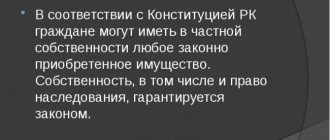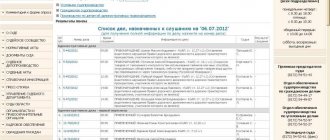What is meant by invasion of privacy?
The Criminal Code treats the collection of personal and family information illegally, as well as its public dissemination, as an invasion of privacy. Also, the private life of citizens is protected by the Civil Code. Article 152.2 specifies a direct prohibition on the receipt and use of personal data, including place of residence, marital status and other personal information. Within the framework of civil law, citizens can, on the basis of Article 150 of the Civil Code of the Russian Federation, demand the protection of intangible benefits.
In addition, Federal Law No. 152 “On the Protection of Personal Data” sets the main goal of protecting human rights and freedoms in the field of privacy, personal and family secrets, when transferring this information to third parties.
Civil protection of the inviolability and privacy of citizens' personal lives
Civil protection of privacy
The right to inviolability of home is a personal non-property right of a citizen, designed to ensure the protection of one of the most important elements of his personal life. The legal boundaries of this element of personal life are determined by the citizen’s legally available housing. This circumstance determines the close connection of the right to the inviolability of the home with the right to housing. However, despite their external similarity, these are different rights that require different means of regulation.
The right to inviolability of home has not yet been reflected in civil law, which does not detract from its importance. Like other personal non-property rights, it is absolute in nature and is expressed in the ability of the authorized person to determine the conditions of access to his legally owned home, to demand the elimination of any circumstances that violate the inviolability of his home. At the same time, if a citizen suffers property damage as a result of a violation of this right, he has the right to demand compensation.
The law may provide for cases when obtaining access to a citizen’s home does not require his consent. Thus, criminal procedural legislation determines the procedure for access to the home of citizens in connection with a search; administrative legislation regulates cases of such access to the home in the event of emergency situations (fire, accidents of electrical, heating and gas networks, etc.). However, representatives of the relevant bodies and organizations are obliged to strictly and carefully comply with the requirements imposed by law on the grounds, conditions and procedure for gaining access to a citizen’s home without his consent. Violation of these requirements should serve as a basis for applying appropriate protective measures to violators.
The right to the inviolability of personal documentation is one of the few personal non-property rights of citizens ensuring the inviolability of their personal lives, which was reflected in some civil laws of the Soviet period (Article 491 of the previously in force Civil Code of Kazakhstan, Article 540 of the previously in force Civil Code of Uzbekistan), but in the civil It was never formulated in Russian legislation.
This right is defined as the ability of an authorized person to grant, at his own discretion, the right to publish, reproduce or distribute information contained in his personal documentation (letters, diaries, notes, etc.). By nature, the right to the inviolability of personal documentation is absolute, therefore an indefinite circle of obligated persons must refrain from actions that violate the right in question. After the death of the citizen to whom the documentation belonged, this right passes to his closest relatives (children, parents, surviving spouse).
Types of invasion of privacy
Invasion of privacy is considered by the Criminal Code to be the collection and storage of information about a citizen’s identity.
Note!
Article 152.2 of the Civil Code means by private life information about origin, place of stay, residence, personal and family life.
Also, Article 152.1 of the Civil Code of the Russian Federation protects images of citizens: the use and publication of photographs, videos and works of art in which a citizen is depicted is possible only with consent.
Invasion of personal affairs
The Federal Law “On Personal Data” defines personal information as any information relating directly to information relating to a directly or indirectly identified and identifiable person.
Obtaining information about the name, date, place of birth, marital status, address, availability of property, level of education and profession is possible only with the consent of the citizen or by court decision. In other cases, gaining access to this data is considered an intrusion into personal affairs.
Note!
Roskomnadzor clarified that the amount of a citizen’s salary and income is personal information and is protected by law.
When there is a restriction on the right to privacy
The law allows cases of ignoring the protection of privacy. According to Article 9 of the Law on Operational-Investigative Activities, the secrecy of correspondence, messages, and other manifestations of privacy is violated by a court decision. The authorized bodies are required to submit a petition to the court, justifying the need for the violation.
Threats to the privacy of citizens from law enforcement agencies arise in cases that require urgent obtaining of information. For example, involvement in a serious crime, the likelihood of the criminal hiding. Law enforcement officers can carry out any event that infringes on a citizen’s privacy. After the event is completed, the court is notified within 24 hours.
The Constitutional Court of the Russian Federation explains: every individual case of violation of privacy requires a thorough examination of the circumstances.
Assigning a name or appearance
According to Article 19 of the Civil Code, the acquisition of rights and the performance of obligations is carried out under one’s own name.
In addition, according to the Civil Code, Russians have the right to a pseudonym and change their name. Paragraph 4 of Article 19 of the Civil Code of the Russian Federation outlines a ban on acquiring rights under someone else’s name. Moreover, in the second paragraph of this paragraph, the legislator allows the use of a citizen’s name with his consent for creative and entrepreneurial activities, if this does not mislead third parties.
Illegal use of a first and last name is subject to legal protection under Article No. 152 “On the Protection of Honor, Dignity and Business Reputation” and Article No. 151 “Compensation for Moral Damage”
Civil legal protection of individual freedom of citizens
Individual freedom of a citizen, inviolability and secrecy of his personal life as independent objects of civil legal protection
The purpose of civil law protection of personal non-property rights of citizens is to provide their subjects with the opportunity to have a certain autonomy from the state, society, as well as various kinds of social groups. Such autonomy can have a dual expression and is ensured by providing the citizen with individual freedom and immunity, as well as by protecting the privacy of personal life.
The individual freedom of a citizen is ensured by granting him a number of personal non-property rights designed to protect various aspects of the manifestation of his personality from outside interference (except for cases expressly provided for by law).
For example, these are rights aimed at individualizing the personality of the authorized person (the right to a name, the right to protection of honor and dignity), and rights aimed at ensuring personal integrity (the right to bodily integrity, the right to protection of life and health, the right to inviolability of personal appearance , the right to privacy of personal image).
The inviolability and secrecy of a citizen's personal life is ensured by granting him such personal non-property rights that make it possible to protect his behavior in individual life from outside interference, except in cases where such interference is permitted by law. These rights include: the right to inviolability of home, personal documentation, the right to privacy of personal life, including the secrets of personal information, adoption, deposits in banks and other credit organizations, personal correspondence and telephone and telegraph messages, performance of notarial and some other legal actions, lawyer's, medical confidentiality, etc.
Thus, despite the fundamental unity of relations related to ensuring individual freedom, inviolability and protecting the privacy of citizens’ personal lives, they represent independent objects of protection and require separate regulation taking into account their specifics.
Right to a name
The right to a name is one of the most important personal non-property rights of a citizen, aimed at individualizing his personality. It is a very complex legal category and is regulated by the norms of various branches of law. Thus, the procedure for assigning and changing a name is established by the norms of administrative and family law. The name received by a citizen at birth, as well as a change of name (to which a citizen has the right in accordance with paragraphs 2 and 3 of Article 19 of the Civil Code) are subject to registration in the manner established for registration of acts of civil status. A citizen has the right to appeal against the incorrect indication of his name in electoral lists and civil status acts.
There may be cases when the right to a name is protected simultaneously with other personal non-property rights that are regulated by civil law. If, for example, the right to a name is violated in connection with a violation of the honor and dignity of a citizen, then its protection is carried out through the protection of honor and dignity. In this regard, in paragraph 5 of Art. 19 of the Civil Code emphasizes that when a citizen’s name is distorted or used in ways or in a form that affects his honor, dignity or business reputation, the rules provided for in Art. 152 Civil Code.
At the same time, the right to a name, being a right of a strictly personal nature, needs civil regulation both from the point of view of the rules for its use by the owner himself in civil circulation, since this is important for its stability and certainty, and from the point of view of protection from the use of it by third parties without legal grounds. Citizen, according to paragraph 1 of Art. 19 of the Civil Code, acquires and exercises rights and obligations under its own name, including the surname and first name, as well as patronymic, unless otherwise follows from the law or national custom. The law (clause 4 of article 19 of the Civil Code) directly prohibits the acquisition of rights and obligations under the name of another person. Currently, the names of famous personalities are increasingly being used for advertising and other commercial purposes, i.e. in essence become the object of some kind of licensing agreements. In this regard, it is obvious that using a person’s name without his consent for the purpose of obtaining property or other benefits is illegal. In cases and in accordance with the procedure provided by law, a citizen may use a pseudonym (fictitious name). The right to a name is one of the essential elements of subjective copyright (subclause 3, clause 2, article 1255 of the Civil Code).
Protecting a person’s name is also necessary in cases where third parties do not receive any benefit from it. For example, according to Art. 41 of the Federal Law “On the Mass Media” (hereinafter referred to as the Law on the Mass Media), the editorial board, the media and the journalist do not have the right to name the person who provided the information under the condition of non-disclosure of his name, except when required by the court.
Thus, in civil law, the right to a name is a personal non-property right of a citizen, not related to property rights; it represents the citizen’s ability to acquire and exercise rights and obligations under his own name, as well as to demand that his name be used by third parties only with his consent if, as a result of their use, property benefits are or can be obtained. In cases where no benefit is obtained, the citizen's name can be used without his consent only within the limits established by law.
Protection of the right to a name is carried out in accordance with clause 5 of Art. 19 of the Civil Code using the rules on compensation for harm. Harm caused to a citizen as a result of the unlawful use of his name is subject to compensation in accordance with Chapter. 59 Civil Code.
Right to honor, dignity and business reputation
The right to honor, dignity and business reputation is a personal non-property right of a citizen, which has received the most extensive civil legal protection. The right of citizens to protect honor and good name is their constitutional right, provided for in Part 1 of Art. 23 of the Constitution of the Russian Federation. This constitutional right is guaranteed not only by civil law norms, but also by the norms of other branches of law.
According to Art. 150 of the Civil Code, personal dignity, honor and good name, as well as business reputation are the objects of personal non-property rights of citizens. Honor in theoretical literature and in judicial practice is understood as a public assessment of socially significant and moral qualities inherent in a citizen, and dignity is a citizen’s self-assessment of these qualities. Mentioned in Art. 150 of the Civil Code, along with honor, a good name, as well as the category “reputation”, often used in legal literature, are synonymous.
As for a citizen’s business reputation, this is a public assessment exclusively of his professional qualities, including as an individual entrepreneur. Taking this into account, it is necessary to emphasize that business reputation is equally enjoyed by both individual entrepreneurs and other persons (workers, engineers, teachers, doctors, persons in creative professions, etc.).
In civil law, the right to honor, dignity and business reputation as a personal non-property right of a citizen, not related to property rights, is an opportunity enshrined in law to demand from an indefinite circle of obligated persons to refrain from any actions aimed at belittling his honor, dignity or business reputation, as well as the possibility of going to court to protect your rights.
According to paragraph 1 of Art. 152 of the Civil Code, actions aimed at belittling the honor, dignity or business reputation of a citizen are the dissemination of untrue information discrediting his honor, dignity or business reputation.
The information disseminated about a citizen must not correspond to reality, i.e. be false. As a general rule, Russian civil law does not provide protection against defamation, which is the dissemination of untrue information discrediting the honor, dignity or business reputation of a person, by refuting it.
However, according to paragraph 3 of Art. 152 of the Civil Code, a citizen in respect of whom the media published information that infringes on his rights and legally protected interests has the right to have his response (but not a refutation) published in the same media, even if the disseminated information was true. If such information was expressed in an offensive form or, for example, contained personal data of limited access related to the secret of personal life, the person who disseminated it in the media may be obligated to compensate the victim for moral damage (Articles 150, 151 of the Civil Code).
The dissemination of information discrediting the honor, dignity or business reputation of a citizen means bringing it to the attention of third parties in any form accessible to them: publication of relevant information in the press and other media, distribution on the Internet, presentation in job descriptions , public speeches, statements addressed to officials, or communication in another, including oral, form to at least one person (except only the person to whom they concern). In the ways specified in Art. 152 of the Civil Code does not protect demands to refute information contained in court decisions, sentences, decisions of preliminary investigation bodies and similar official documents, for appeal of which another procedure established by law is provided.
Discrediting the honor, dignity or business reputation of a citizen is considered, in particular, information containing messages about a citizen’s violation of current legislation or moral principles of society, for example, about his committing a dishonest act, incorrect, unethical behavior in personal, public or political life, dishonesty in the implementation of production -economic and entrepreneurial activities, violation of business ethics or business customs, etc. (Clause 7 of the Resolution of the Plenum of the Armed Forces of the Russian Federation dated February 24, 2005 No. 3).
Consequences of violation of the right to honor, dignity and business reputation
A citizen is given the right to demand a refutation of information that is untrue, discredits his honor, dignity or business reputation in court. Consequently, refutation of such information is a special civil legal method of protection associated with the need for the injured person to apply to the competent state authorities for protection of his rights and with the goal of restoring the personal sphere of the injured person. Therefore, it should be considered as one of the types of state-compulsory regulatory measures.
Specific methods for refuting this information are established in Art. 152 Civil Code.
If such information is disseminated in the media, then it must be refuted in the same media in the manner prescribed by Art. 43 and 44 of the Law on Media. In particular, a refutation in a periodical printed publication must be typed in the same font and placed under the heading “Refutation”, as a rule, in the same place on the page as the message or material being refuted. On radio and television, a refutation must be broadcast at the same time of day and, as a rule, in the same program as the message or material being refuted. The length of a rebuttal cannot be more than twice the length of the rebutted fragment of a disseminated message or material, but cannot be shorter than one standard page of typewritten text (or take up less airtime than it takes for the announcer to read a standard page of typewritten text).
Within a month from the date of receipt of the request for a refutation or its text, the editorial office is obliged to notify the interested citizen or organization in writing about the expected time frame for distributing the refutation or about the refusal to distribute it, indicating one of the grounds for refusal listed in Art. 45 of the Law on Mass Media (in particular, if the request for a refutation or the submitted text was received by the editor after one year from the date of dissemination of the refuted information in this mass media). Such a refusal may be appealed in court.
If the specified information is contained in a document emanating from the organization, then such a document is subject to replacement or revocation. If this information is disseminated in other ways or in other forms, the procedure for refuting it adequately in each specific case is established by the court. In this regard, when satisfying the claim, the court in the operative part of the decision is obliged to indicate the method of refuting defamatory information that does not correspond to reality and, if necessary, set out the text of such a refutation, which should indicate what information is untrue, when and how it was disseminated, and also determine the period (in relation to that established by Article 44 of the Law on the Media) during which it must follow (clause 17 of the resolution of the Plenum of the Armed Forces of the Russian Federation of February 24, 2005 No. 3).
Along with this, the protection of honor, dignity and business reputation of a citizen can also be carried out through measures of civil liability. In accordance with paragraph 5 of Art. 152 of the Civil Code, a citizen in respect of whom information discrediting his honor, dignity or business reputation has been disseminated, has the right, along with a refutation of such information, to demand compensation for losses and moral damage caused by its dissemination.
Parties in cases of protection of honor, dignity and business reputation
Plaintiffs in cases of refutation of information discrediting honor, dignity or business reputation are citizens who believe that defamatory information that does not correspond to reality has been disseminated about them. They are required to prove the fact that such information was disseminated by the defendant, as well as the fact that this information discredits their honor, dignity or business reputation. When disseminating defamatory information regarding minors or incompetents, claims to protect their honor and dignity in accordance with Art. 37 and 52 of the Code of Civil Procedure can be presented by their legal representatives.
In accordance with paragraph. 2 p. 1 art. 152 of the Civil Code, with a requirement to protect the honor and dignity of a citizen, interested parties have the right to go to court even after his death. Moreover, the interested parties in this case should not be associated only with the relatives of the deceased person. Interested parties can be recognized as a much wider range of persons (government bodies, public and religious associations, other organizations with the rights of a legal entity, work colleagues, fellow students, front-line comrades, etc.).
The defendants in claims to refute information discrediting honor, dignity or business reputation are the persons who disseminated this information. According to paragraph 1 of Art. 152 of the Civil Code, the burden of proving the accuracy of information discrediting the honor, dignity or business reputation of a citizen rests with the person who disseminated it.
In cases where such information was disseminated in the media, the author and the editorial board of the relevant media outlet are brought in as defendants (and if it is not a legal entity, the founder of the media outlet). If there are circumstances that may serve as a basis for their release from liability for the dissemination of such information, citizens and organizations from which the relevant information was received must be involved in the case. If the claim is successful, the editorial office of a media outlet brought in as a defendant may be required to report the court’s decision even if there are grounds excluding its liability.
If false and defamatory information about a citizen was disseminated by an employee on behalf of the organization (for example, in a job description), it becomes the defendant in the lawsuit (clause 5 of the resolution of the Plenum of the Armed Forces of the Russian Federation of February 24, 2005 No. 3).
If it is impossible to identify the person who disseminated information discrediting the honor, dignity or business reputation of a citizen (for example, when sending anonymous letters or disseminating information on the Internet, spreading rumors, etc.), the citizen in respect of whom such information was disseminated , has the right to apply to the court to declare the disseminated information untrue (clause 6 of Article 152 of the Civil Code). Due to the absence of the defendant, such claims are considered in special proceedings (clause 2 of Article 262 of the Code of Civil Procedure). It seems that we are talking about an independent, special civil law method of protecting a citizen’s right to honor, dignity and business reputation.
According to Art. 208 of the Civil Code, claims for refutation of information discrediting the honor, dignity or business reputation of a citizen, as well as for compensation for losses and moral damage caused by their dissemination, and for recognition of disseminated information as untrue, are not subject to the statute of limitations. According to Part 3 of Art. 45 of the Law on the Mass Media, refusal to refute or violation of the procedure for refutation established by this law can be appealed to the court within a year from the date of dissemination of the refuted information. This shortened limitation period is applicable only in relation to the special refutation procedure defined in parts 1–3 of Art. 44 of the Law on Mass Media1.
Right to integrity of appearance
We are talking about the personal non-property right of a citizen, aimed at ensuring the personal integrity of a person. The current civil legislation does not define this right. In the literature, in some cases, the inviolability of external appearance is understood as protection from illegal reproduction with subsequent distribution of material media of visual information, in others – protection from illegal determination by state bodies and public organizations of requirements for the external appearance of a citizen. The latter point of view is more preferable, since it quite broadly outlines the boundaries of this right and allows us to consider the right to an image as an independent personal non-property right of a citizen.
Requirements for appearance may be determined by legislation regulating labor relations with certain categories of employees. As a rule, these are departmental regulations that establish requirements for clothing, appearance, etc. in certain areas of activity (for example, trade and catering, the provision of hygiene services, baking and meat and dairy industries, etc.).
In some cases, when a person’s appearance offends public morality and, along with his actions, indicates a clear disrespect for society, it is possible to bring such a subject to administrative and even criminal liability (Article 213 of the Criminal Code).
Consequently, the right to inviolability of appearance in civil law represents the ability of an authorized person to demand the elimination of any circumstances (including illegal decisions of state bodies and public organizations, as well as citizens) that damage the inviolability of his appearance, unless the legislation provides for special requirements for the appearance of a citizen or his appearance contradicts the requirements of the law and moral standards.
Right to privacy of personal image
This right is now expressly provided for in Art. 1521 Civil Code. It was introduced into law at the insistence of a number of cultural figures who protested against the intrusive attention to their personalities from some media. The right in question is also aimed at ensuring the personal integrity of a person.
It lies in the fact that the publication and use of an image of a citizen, including photographs, videos and works of fine art in which he is depicted, is permitted only with the consent of the person depicted, and after his death - with the consent of his children and surviving spouse (in their absence - with parental consent). Thus, the distribution of a citizen’s image can only be carried out with his consent, and after his death - with the consent of his closest relatives.
The consent of the person depicted is not required for the image, in particular if the distribution is carried out in state, public or other public interests or was obtained during filming in places open to the public or at public events, as well as in cases where the citizen posed for a fee .
Right to bodily integrity, protection of life and health
This is a fundamental personal non-property human right aimed at ensuring personal integrity. In civil law and legal literature, the issue of civil protection of this right with the help of obligations arising from causing harm has been deeply developed. The protection of this right in certain cases can also be ensured by the institution of contractual liability.
Civil protection of bodily integrity, life and health cannot be reduced only to compensation for harm caused. Currently, there is a need to provide citizens with the right to demand the elimination of any circumstances that violate the healthy and safe conditions of their lives.
This right is closely related to the right to a healthy environment, which is the subject of study by representatives of environmental (ecological) law and represents one of the most important rights of citizen-consumers.
The formulation of this right as absolute and ensuring its protection through civil legal means should play a positive role in creating decent living conditions for people. In addition, this does not prevent citizens from demanding compensation for harm caused to life and health.
Dissemination of information about private life
This is understood as the publication in the public space, as well as the use in the press or on the Internet, of information about a person without his consent.
Part 3 of norm 137 of the Criminal Code provides for punishment for the publication of information about the identity of a victim in a criminal offense under the age of 16 years.
Mention in the public space of descriptions of the suffering of a minor who has suffered during the commission of a criminal offense entails a financial penalty in favor of the state in the amount of 150 thousand to 300 thousand rubles or the total income of the perpetrator for three years.
Also, a person convicted of violating this provision of the law may be deprived of the opportunity to engage in certain professional activities or be required to perform forced labor for five years. The most severe punishment for disseminating information about private life can be arrest for six months or imprisonment for five years.
Note!
Based on part 4 of norm 152.2 of the Civil Code, citizens have the right to petition the court to delete or confiscate video recordings and other documents containing data about their personal lives.
Data about a citizen’s personal life obtained as part of investigative actions is also protected. According to the Federal Law “On Police,” law enforcement officers may request additional information to identify a citizen, including from medical institutions. The transfer of this information, in accordance with Part 6 of Article 5 of the Law, cannot be transferred to third parties without the consent of the citizen, with the exception of situations of initiation of criminal and administrative cases, when documents are transferred to the investigative authorities and the court.
Violation of the confidentiality of correspondence and other communications
The Criminal Code protects correspondence, telephone conversations, postal, telegraph and other messages. Violation of this secret on the basis of Article 138 of the Criminal Code of the Russian Federation threatens with a material penalty in favor of the state of up to 80 thousand rubles, compulsory or corrective labor. Violation of the inviolability of the home is also subject to criminal liability.
Restriction of the right to privacy of correspondence, telephone conversations and other methods of exchanging information is possible on the basis of Article 13 of the Criminal Procedure Code only if there is an appropriate court decision.
What to do when privacy and family life is violated
The police are investigating the violation of privacy. An allegation of violation of privacy is filed.
Important:
When filing an application, it is worth considering that the police are obliged to verify the fact of a crime of violation of privacy and you need to provide evidence.
If false information is disseminated, witness testimony, photographs, video materials, and documentary evidence must be provided. A knowingly false denunciation faces criminal liability (Article 306 of the Criminal Code of the Russian Federation). Confirmation of the stated information is accompanied by the initiation of a criminal case.
The protection of privacy is implemented by the court. It is permissible to file a claim for compensation for damage caused. Non-material damage may also be compensated. The refusal of the police to initiate a criminal case regarding the protection of a person’s right to privacy can be challenged in the prosecutor’s office or in court.
Register now and get a free consultation from Specialists
When there is no punishment
According to norm 20 of the Criminal Code, punishment is not provided for violating the secrets of private and family life in cases where the person who committed this crime has not reached the age of 16 years.
Note!
The Civil Code, in the second paragraph of part 1 of norm 152.2, removes liability for violation of privacy and the dissemination of personal information in state or public interests.
According to the Supreme Court Resolution No. 16 of 2010, paragraph 25, in judicial practice a distinction should be made when publishing information in the media about the private life of officials, when it has a positive effect on public discussion, and publishing information in the press about the private life of citizens, not engaged in public activities.
When considering cases involving the publication in the media of details of the personal lives of public and government figures, the court is guided by the principle of journalists fulfilling their public duty.
Criminal article for violation of personal space
Criminal article for violation of personal space and inviolability of home. Responsibility for violating the inviolability of a citizen’s place of residence is provided for by norm 139 of the Criminal Code.
Note!
Entering a house against the owner’s wishes is punishable by a financial penalty in favor of the state of 40 thousand rubles or compulsory work for 360 hours.
If the violation of personal space occurred with the use of violence or with the use of official position, the punishment is increased. The court may sentence those guilty of committing these actions to a fine of 300 thousand rubles or imprisonment for a period of up to 3 years. Persons who have committed illegal entry into a home using their official position may also be deprived of the right to engage in certain professional activities by court decisions.





